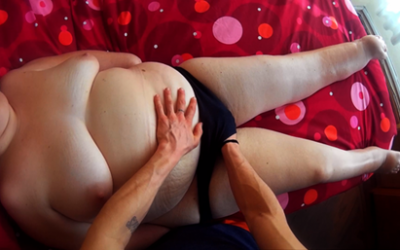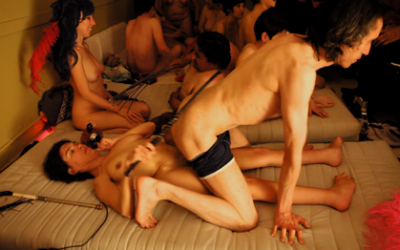Desiring and other fictions*
by Andrea García-Santesmases
Desvelada | A feminist and anti-ableist look at contemporary representations of the body, (dis)ability and sexuality, by Andrea García-Santesmases
Media and cultural representations of functional diversity (disability) tend to answer to this “thesis of personal tragedy,” to the idea that these people’s lives are necessarily and essentially painful and therefore “not worth living”. In my previous post, I reviewed the movie “MeBefore You” as an excellent example of this as negative as usual representation. One of the pillars of this quasi-eugenic paradigm is to present these lives as having no joy, as a sterile land where neither desire nor pleasure can flourish. Documentaries like Yes, we fuck! show the fallacy of this cultural construction, showing stories of disabled people who enjoy rich and pleasurable sexuality.
But we need more dissident representations, which not only break the taboo, but also that bring out how ridiculous is thinking that people with disabilities are asexual, beyond the temptations of the flesh. Therefore, knowing that the film Living and other fictions (Jo Sol, director of Fake Orgasm), co-starring Antonio Centeno (an activist with functional diversity and the co-director of Yes, we fuck!), will be presented at the San Sebastian Festival, is excellent news. This film, made in extreme precariousness and enthusiastic conditions, dares to address controversial issues such as sexual assistance or internalization of people diagnosed with mental illness. For now, only the trailer is available which already promises sex, pills and flamenco.

[Picture by Afra Rigamonti, Vivir y otras ficciones (Jo Sol, 2016)]
“Living and other fictions” aims to jeopardize the ideas of body, mental and functional normality, through the subversion of their usual codes of representation. It’s more than a movie; it’s a collaborative project that during its growing process has been giving pellets of humour and reflection. In its latest video, “Anomalías Recalcitrantes” you can see these people that flee from the hegemonic body patterns and are proud before the camera, defiant against the social norm that tells them that their bodies should be ashamed and hidden. Theirsharpen looks become ironic while speeches defending the existence of “normal” people (and therefore valuable and respectable ones) and “not normal” are projected. And this leaves us with the uneasy feeling of not knowing in which group we’re in nor, what is even more disturbing, in which we want to be.
Humour has been one of the self-promotion strategies of “Living and other fictions” through campaigns such as “Yo me masturbo”, which also had the brilliant idea of disseminating through a false story that claimed that Barcelona’s council would provide sexualassistance to its diverse population. Just imagine both the excitement and the general amazement of believing that hand jobs would be part of the public budget!
In the same sense of using parody as a destabilizing tool of this capacity-obsessed common sense, they also created the “Crip Pride” campaign – photomontages in which people with disabilities appeared on the covers of famous magazines. Regarding sexuality, the cover of Playboy starring Oriol Roqueta (an activist with cerebral palsy), was undoubtedly the most celebrated. Just picture a magazine which is the best example of the objectification of the (female) body and patriarchal practices, promoting a “crippled” person looking at the camera and proclaiming “Crip is sexy!”.

[Picture by Afra Rigamonti, Vivir y otras ficciones (Jo Sol, 2016)]
“Living and other fictions” uses fiction to destabilize reality, humour to question common sense and beauty to run goosebumps on your skin. This project teaches us that other lives are possible and desirable, and that laughter, desire and pleasure bloom even in the most inhospitable piece of land.
OTHER POSTS FROM ‘DESVELADA’
¿Disability and sex? Yes, we fuck! | by Andrea García-Santesmases
Desvelada | A feminist and anti-ableist look at contemporary representations of the body, (dis)ability and sexuality, by Andrea García-Santesmases
Me Before You or, rather, “me without sex” | by Andrea García-Santesmases
Desvelada | A feminist and anti-ableist look at contemporary representations of the body, (dis)ability and sexuality, by Andrea García-Santesmases
‘I am sexy and I know it!’ Viktoria Modesta y el deseo sexual por los cuerpos amputados | by Andrea García-Santesmases
Desvelada | A feminist and anti-ableist look at contemporary representations of the body, (dis)ability and sexuality, by Andrea García-Santesmases
What would your life be like if you couldn’t masturbate? Sexual assistance, an essential support for people with functional diversity | by Andrea García-Santesmases
Desvelada | A feminist and anti-ableist look at contemporary representations of the body, gender, (dis)ability and sexuality, by Andrea García-Santesmases
“To fuck you must have imagination” Postporn and functional diversity | by Andrea García-Santesmases
Desvelada | A feminist and anti-ableist look at contemporary representations of the body, gender, (dis)ability and sexuality, by Andrea García-Santesmases




